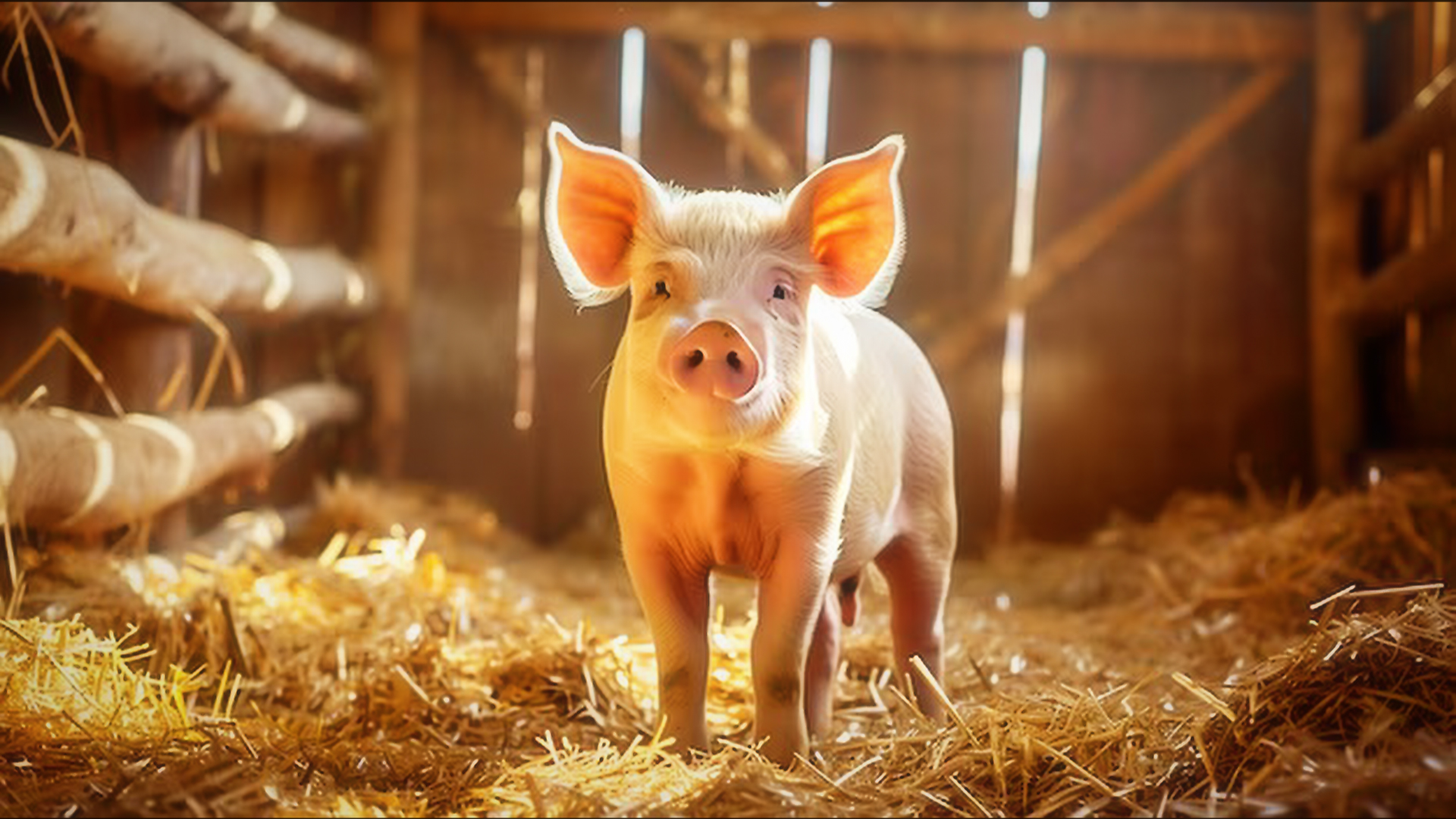The Hidden Genius of Pigs: Exploring Their Cognitive and Emotional Intelligence

Pigs are often thought of as simple, farmyard creatures, but this stereotype couldn’t be further from the truth. New research has revealed that pigs are highly intelligent animals, displaying cognitive abilities that rival those of primates and even young human children. The depths of their intelligence are just beginning to be uncovered, and as we learn more, it’s clear that pigs deserve our respect and appreciation for their complex minds.
The Cognitive Capabilities of Pigs: Memory, Problem-Solving, and Learning
Recent groundbreaking studies, including those from Emory University, have provided compelling evidence of the cognitive prowess of pigs. These animals are not only capable of solving complex problems, but they also have remarkable memory skills. For example, pigs can easily navigate intricate mazes and remember the locations of objects for extended periods, which showcases their impressive long-term and spatial memory.

Furthermore, pigs demonstrate exceptional problem-solving abilities. They are quick learners, capable of adapting to new challenges that require sophisticated thinking. In one study, pigs were observed using tools to solve problems—an ability that was once thought to be restricted to only a few highly intelligent species, such as primates and birds. Their capacity to differentiate between various objects and symbols further emphasizes their cognitive sophistication.
When compared to other animals, pigs exhibit intelligence on par with dogs and even some primates. This makes them a fascinating subject of study for those interested in animal cognition and behavior. Explore more about animal intelligence and cognition here.
Emotional Intelligence in Pigs: A Deeper Connection to Feelings and Empathy
In addition to their impressive cognitive abilities, pigs also display a remarkable level of emotional intelligence. Research has shown that pigs are capable of experiencing a wide range of emotions, including joy, fear, and empathy. These complex emotional responses are indicative of their deep social awareness and understanding of the emotional states of others in their group.
One of the most fascinating aspects of pigs’ emotional intelligence is their ability to recognize the feelings of other pigs. They can respond to the emotional cues of others, whether it be comfort or distress, which speaks to their empathetic nature. This social sensitivity extends beyond their interactions with fellow pigs to their relationships with humans and other animals. Pigs have been observed forming strong bonds with their human caretakers, demonstrating their capacity for attachment and emotional connection.
The emotional depth of pigs is a reminder that animals often have far more complex emotional lives than we give them credit for. To better understand how emotions play a role in animal behavior, you can delve deeper into the study of animal emotions here.
Where Do Pigs Rank Among the Most Intelligent Animals?
While many people consider primates and dolphins as the pinnacle of animal intelligence, pigs are not far behind. In fact, research has placed pigs among the top five most intelligent animals on Earth, surpassing the cognitive abilities of other animals traditionally regarded as highly intelligent, such as dogs.
One of the most remarkable demonstrations of pigs’ intelligence is their ability to understand reflections in mirrors. This cognitive milestone is often used as a test of self-awareness, a trait that typically develops in young children at around 18 to 24 months of age. Remarkably, piglets were able to recognize themselves in mirrors just a few hours after exposure, indicating a level of self-awareness that is rare in the animal kingdom.
This ability to recognize their own reflection suggests that pigs possess a sophisticated level of cognitive processing, enabling them to reflect on their own existence in a way that was once thought to be unique to humans and a few primate species. If you’re curious to explore more about the mirror test and its implications for animal cognition, check out this in-depth article on the mirror test.
Changing Perceptions: The Need to Reevaluate How We Treat Pigs
Despite their exceptional intelligence, pigs are still largely overlooked in conversations about animal cognition. As research continues to uncover their complex minds and emotional lives, there is growing recognition among scientists and animal behaviorists of the need to rethink how pigs are treated, both in farming and in scientific research.
This evolving understanding of pigs’ cognitive and emotional capacities has important implications for their welfare. If society begins to acknowledge pigs’ intelligence and emotional sensitivity, we can advocate for more humane treatment in farming practices. It’s crucial to reconsider how pigs are raised and how they are integrated into research experiments. By respecting their cognitive abilities, we can ensure that pigs are treated with the dignity they deserve.
As we continue to push for ethical practices, the increasing recognition of pigs’ emotional and cognitive depth could lead to meaningful changes in animal welfare policies. For more on how we can improve the treatment of intelligent animals like pigs, explore this informative article on animal welfare.
What Does the Future Hold for Our Relationship with Pigs?
As our understanding of pigs’ intelligence deepens, we must consider how this knowledge will shape our interactions with them in the future. It’s not just about recognizing that pigs are clever or emotionally aware; it’s about transforming our approach to how we treat these remarkable animals.
Given their advanced cognitive abilities, pigs have the potential to contribute significantly to fields such as animal behavior research, psychology, and even artificial intelligence. Their problem-solving skills and ability to adapt to complex tasks offer valuable insights into the evolution of intelligence and cognition in the animal kingdom.
Moving forward, it’s essential that we continue to advocate for better living conditions for pigs and other farm animals. By improving our understanding of their cognitive and emotional worlds, we can create environments that are more aligned with their needs. The more we learn about pigs, the more we realize that they are not just livestock—they are sentient beings capable of deep thought and emotional connection.
Conclusion: A Call for Greater Recognition and Respect
In conclusion, pigs are far more intelligent and emotionally complex than most people realize. Their ability to solve problems, remember locations, and exhibit empathy underscores their remarkable cognitive and emotional depth. These traits place pigs among the most intelligent creatures on Earth, demonstrating that their mental capabilities are on par with those of many mammals traditionally celebrated for their intelligence, such as dogs and primates.
However, the way pigs are perceived and treated still lags behind this newfound understanding. It is crucial that society begins to embrace these animals not as mere farm commodities, but as sentient beings deserving of compassion and respect. By acknowledging pigs’ advanced cognitive and emotional abilities, we open the door to more humane practices in both agriculture and animal research. This shift in perspective could lead to improved living conditions, better welfare standards, and ultimately, a greater emphasis on ethical treatment.
Moreover, as we deepen our understanding of pigs, we can also foster greater empathy and appreciation for the connections they form with their human caregivers and fellow animals. Their emotional intelligence has the potential to enrich our own relationships and influence how we interact with animals across the board.
Ultimately, advocating for pigs’ well-being is not just about ethical considerations—it’s about acknowledging their rightful place as sentient beings in a world that is increasingly aware of the cognitive and emotional lives of animals. As research continues to highlight their intelligence and emotional depth, we must ensure that these animals are given the recognition, respect, and care they deserve in every aspect of their lives.
Featured Image Credit: Getty Images






